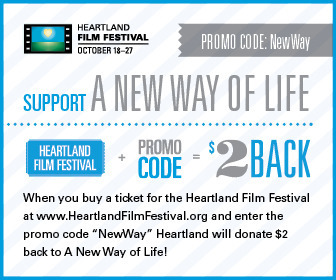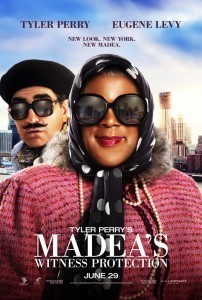Maurice Broaddus's Blog, page 33
October 1, 2012
A Couple of Good Causes
This seems to be the week for me to be bringing news about causes to donate to, but here are the first two:
1) My friend (and a previous Mo*Con Guest of Honor, which should show you the high regard I hold this man in), Tom Piccirilli, has been diagnosed with brain cancer. Medical bills for a full time writer (read: no insurance) can be devastating. Consider donating to the Indiegogo that’s helping to raise money for him. Alternately, if you buy one of his books from Crossroad press, he gets 100% of the profit from the sale. If nothing else, please keep him in your thoughts and prayers.
2) A non-profit I’m involved with, A New Way of Life, is doing a fundraiser through the Heartland Film Festival. The 2012 Heartland Film Festival $2BACK Program gives us $2 back for every ticket purchased online! Use the promo code NewWay (I’m especially looking forward to the movie Inocente). This is an amazing opportunity to support both Heartland Truly Moving Pictures and A New Way of Life!
Dark Faith: Invocations is here!
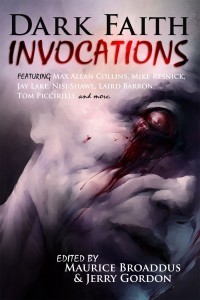 With Dark Faith: Invocations finally being out (it feels like the longest birth ever, and now I’m stuck with the image of me between Jason Sizemore’s legs yelling “Push!”), we’ve been all over the place trying to get the word out. But rather than do blog after blog on everything that goes up, I’m doing a one-stop shopping kind of post:
With Dark Faith: Invocations finally being out (it feels like the longest birth ever, and now I’m stuck with the image of me between Jason Sizemore’s legs yelling “Push!”), we’ve been all over the place trying to get the word out. But rather than do blog after blog on everything that goes up, I’m doing a one-stop shopping kind of post:
-Don’t know where to start? The Apex Books Gateway Guide: Dark Faith Invocations is always happy to help.
-Elizabeth Twist talks about the inspiration for her story, Kill the Buddha.
-Because we’re not afraid of free samples, here’s Jennifer Pelland’s Sacrifice
-Speaking of free samples, here’s a reading of K. Tempest Bradford’s story, The Birth of Pegasus (with an assist by Mary Robinette Kowal)
Reviews
-Fangoria reviews Dark Faith: Invocations (my fanboy heart skips a beat)
Interviews
-Wag the Fox discusses slush piles with me
-Apex goes all investigative reporter on me
Podcasts
-Writing Excuses 7.40: Writing the Other (not specifically on Dark Faith: Invocations, but this was just awesome!)
-Episode 119 – Maurice Broaddus and Jerry L. Gordon (we always have a great time with these guys – Our interview starts at the 18:20 mark if you’re feeling impatient)
-SF Diner (Episode 151): Our Interview with Maurice Broaddus and Jerry Gordon, Editors of the Dark Faith Anthologies (I’ve really got to stop drinking during podcasts!)
September 18, 2012
My Killercon and Context Schedules
As I am busy trying to get caught up on my blogging schedule and various other deadlines I’m watch whoosh past me, I figured I ought to let you know where my last convention appearances will be for the year.
FRIDAY
2:00pm: “It’s The End of The World As We Know It”: Dystopian Fiction and the appeal of the Apocalypse.
Moderator: Lincoln Crisler, Panelists Maurice Broaddus, Brian Keene, William Nolan
SATURDAY
2:00pm: “Why Strangers Have The Best Candy: Writing Young Adult Novels”
Moderator: Bailey Hunter, Panelists: Kelley Armstrong, Maurice Broaddus, F. Paul Wilson
6:30pm: Reading by Maurice Broaddus
Characterization Through Dialogue
Saturday, September 29th, 4 p.m. – 6 p.m.
Characters are at the heart of stories; dialogue helps define characters and drives plot tension. In this workshop you’ll learn to develop characters, consider word choice, and define their voice through dialogue. The workshop will present essential tips to improve dialogue and explore how to write dialogue that rings true, deepens character, creates conflict, and more.
$20
Growing Your Brand
Saturday, September 29th, 6 p.m. – 7 p.m.
You’re not selling books — you’re selling you and your platform. Learn how to share your platform by gaining online followers without selling your soul to the devil. Maurice Broaddus gives real data for what has helped him sell books.
$10
My Killercon and Context Schedules
FRIDAY
2:00pm: “It’s The End of The World As We Know It”: Dystopian Fiction and the appeal of the Apocalypse.
Moderator: Lincoln Crisler, Panelists Maurice Broaddus, Brian Keene, William Nolan
SATURDAY
2:00pm: “Why Strangers Have The Best Candy: Writing Young Adult Novels”
Moderator: Bailey Hunter, Panelists: Kelley Armstrong, Maurice Broaddus, F. Paul Wilson
6:30pm: Reading by Maurice Broaddus
(You can catch me at either of the workshops that I’m giving)
Characterization Through Dialogue
Saturday, September 29th, 4 p.m. – 6 p.m.
Characters are at the heart of stories; dialogue helps define characters and drives plot tension. In this workshop you’ll learn to develop characters, consider word choice, and define their voice through dialogue. The workshop will present essential tips to improve dialogue and explore how to write dialogue that rings true, deepens character, creates conflict, and more.
$20
Growing Your Brand
Saturday, September 29th, 6 p.m. – 7 p.m.
You’re not selling books — you’re selling you and your platform. Learn how to share your platform by gaining online followers without selling your soul to the devil. Maurice Broaddus gives real data for what has helped him sell books.
$10
September 3, 2012
Lessons Learned at Indiana Black Expo
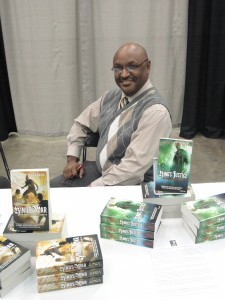 I never had a chance to recap my experience at the Indiana Black Expo. (I’m off at WorldCon right now, which means, at this rate, by sometime mid-winter I’ll be done recapping my summer adventures.) This is part of my on-going experiment on how best to serve an underserved market. You see, a long time ago, I once posed the issue to the genre whether or not we, as black writers, would be better off trying to break into the largely ignored black (audience) market rather than concentrate on being well known in the horror community. Maybe the debate isn’t limited to whether or not black writers, as opposed to all of us horror writers, should pigeon-hole ourselves into the relatively small horror buying market that barely seems to keep the small presses afloat. After all, isn’t the point to reach as large an audience as possible? (This would be the flip side to my comments at another convention where I was on a panel and had the audacity to suggest that black people read so maybe it would be prudent to, you know, market to us.)
I never had a chance to recap my experience at the Indiana Black Expo. (I’m off at WorldCon right now, which means, at this rate, by sometime mid-winter I’ll be done recapping my summer adventures.) This is part of my on-going experiment on how best to serve an underserved market. You see, a long time ago, I once posed the issue to the genre whether or not we, as black writers, would be better off trying to break into the largely ignored black (audience) market rather than concentrate on being well known in the horror community. Maybe the debate isn’t limited to whether or not black writers, as opposed to all of us horror writers, should pigeon-hole ourselves into the relatively small horror buying market that barely seems to keep the small presses afloat. After all, isn’t the point to reach as large an audience as possible? (This would be the flip side to my comments at another convention where I was on a panel and had the audacity to suggest that black people read so maybe it would be prudent to, you know, market to us.)
So putting my publisher’s money where my mouth is, I had a booth at the Indiana Black Expo to sell copies of my Knights of Breton Court series. Even though it was a down year in terms of attendance for the Indiana Black Expo, as a non-genre “con”, it had a cross section of black people from which I could extrapolate many lessons:
1. There’s not a lot of/enough competition. I was the only author selling anything speculative fiction. I was largely up against self-help/empowerment, romance (largely of the “baby mama drama” variety), and crime novels. Plus a disturbing amount of conspiracy/origins books.
2. Horror does not play to the blue hairs. This is still Indiana. We’re still in the shadow of the Bible Belt. Plenty of folks don’t take too kindly to folks playing with faith. My fellow author Wrath James White would have been proud about how many good church folks gave me the “FU glare” after studying the covers of Orgy of Souls and Dark Faith.
3. Speculative fiction is wanted. The number of folks who stopped at my booth just to shake my hand about wore me out. The comments ranged from “we need more black super heroes” (referring to my books, not to me, sadly) to “why can’t we write our own Lord of the Rings.” [Okay, to the person who asked “Are your books like Harry Potter?” I probably shouldn’t have answered “yes, yes they are” to make the sale, but, come on: my dude has a sword and a gun on the cover!]
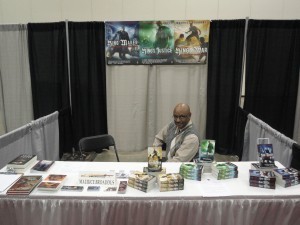 4. I can say I write urban fantasy and have it mean exactly what I think it should mean.
4. I can say I write urban fantasy and have it mean exactly what I think it should mean.
5. Self-publishing has never been frowned upon in the black community. It’s part of the DIY ethos at the heart of how we’re used to getting things done, as anyone who has bought tapes/CDs out of a car trunk can attest to.
6. My ideal demographic is black geeks and/or young males. This makes me think that Onyxcon should be on my radar for next year.
7. Never tell your mom that you have a booth at IBE. I can’t emphasize this enough. My mom, who returned from her retirement home in Jamaica largely to go to Indiana Black Expo, turned my booth into her base of operations. As if my booth only existed for her to drop off her bags. And let me tell you, there’s nothing like having your mom drop off bags full of free condoms she’s managed to scoop up at the health fair. In fact, I’m repressing that memory right now.
August 31, 2012
Hometown Prophet – A Review
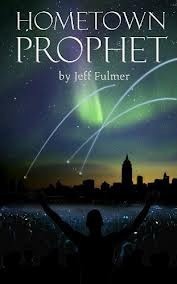 “Only in his hometown and in his own house is a prophet without honor.” –Matthew 13:57
“Only in his hometown and in his own house is a prophet without honor.” –Matthew 13:57
That’s always been one of those verses I get a little uneasy of whenever I hear it. There’s usually an air of presumption by those who tend to quote it, as if the “prophets” in question couldn’t just be kooks. But that might just be me projecting.
Hometown Prophet is a self-published piece of Christian fiction. I rarely review books, especially Christian fiction books, much less a self-published one. But for some reason this one grabbed my attention. Its premise is simple enough: thirty-something Peter Quill moves back to his mother’s home in Nashville, TN. God then sends him prophetic dreams which he is tasked to not only interpret, but act upon. His visions and actions—challenging people’s worship of money, their lack of environmental protection, their inability to love their neighbors (particularly their Muslim ones)—quickly put him in the crosshairs of the local church community, the media, and the community at large.
Author Jeff Fulmer mentions that he grew up in a conservative, charismatic household but became increasingly frustrated with how people used Christianity for their own agenda. It was probably that his story so closely resonated with mine that piqued my curiosity. But as a book borne of reaction, it stumbles into a lot of pitfalls.
The idea of God sending someone prophetic dreams and the trouble it gets them into is and ever-intriguing one. Hometown Prophet has a narrative voice that’s lightly cynical, just this side of a blogger ready to break into a full-on rant. But it’s restrained by being a little too “inside”, using a lot of jargon from (and aimed at) a Christian audience (yet another potential pitfall of Christian fiction). The writing gets a little stilted, especially when it has a point to make, losing the voice of its main character (a thinly disguised authorial voice).
Hometown Prophet doesn’t plumb the depths of the character or the implications of having a prophetic gift, squandering a lot of energy on church politics, Christian pop culture critique, and other easy targets. For a 30 year old, our hero reads like a young post-teen who hasn’t found himself. His endless sarcasm in lieu of development, made for an easy read, but painted him as a light weight character.
On the problematic end of things, we were barely 100 pages in before we encountered a Magical Negro in the form of a homeless man who helps our hero on his way. This is compounded by a Native American our hero encounters at the scene of an environmental disaster (at least the Native American didn’t cry at the sight of all of the pollution).
Then there are the dangers of self-publishing. This book could have used a line editor in the worst way. Fulmer ends up unintentionally switching POVs, it was sometimes unclear whether he wanted to tell the story through his protagonist’s eyes or through the eyes of those around him. The ending forgot about an entire plot thread (the FBI storyline) and collapsed in a mess of a literal Deus ex machina: a flood scene. I’d warn about spoilers, but floods have been the saving grace of all would-be prophets from Noah to Evan Almighty to Eli Stone.
I’ve on occasion heard from a frustrated reader because the story they’re reading isn’t the story they want it to be. Hometown Prophet isn’t as deep as I wanted or expected it to be. It avoided opportunities of significant explorations doubt and struggle. But that’s not the story in front of me. This story strikes me as the first time novel of an author with a deeply personal story they wanted to tell who didn’t have the complete skill set to do it justice. Sort of like a premature birth, everything’s there, just not fully developed. The story’s there, the characters are there, the themes are there, but all of it needed at least one more polish.
Hometown Prophet is a breezy examination of the idea of the impact of a modern day prophet, with all the danger and pathos of a Christian after school program.
August 29, 2012
Tyler Perry’s Madea’s Witness Protection – A Commentary
Let me preface this by saying I ain’t mad at Tyler Perry.*
Seriously. He does his thing. Writer. Director. Actor. He recognized an underserved market, delivered a product aimed squarely at them and has leveraged that success into a multi-million dollar empire. Go ‘head Brother Perry, do your thing.
That said, I’ve never gotten Tyler Perry movies. Every family Thanksgiving or New Year’s Day dinner, my aunt’s house usually has a Madea movie playing in the background, soothing pleasant enough riffs which keeps family drama to a minimum. The movies have always struck me as a little too earnest for their own good, but they work on their terms. Depending on how much attention is being paid to the screen, church may break out as the family segue ways into Madea’s personal Amen corner to whatever topic she may be preaching on. Good for a few laughs, no harm no foul.
That interactive aspect of Tyler Perry’s work, that dose of “real talk”, the kind of conversations you have in the barbershop or at a prayer meeting once the Bibles have been put away, is what is at the heart of the Madea franchise. Madea works best as a reflection of and sometimes critical commentary on us; like the court jester who serves as the truth teller to the king.
Which brings me to Madea’s Witness Protection.
“You got to get in before you fit in.” –Joe (Tyler Perry)
I remember when “crossover” was the big debate word when it came to black artists who weren’t content to bask in their popularity solely within the black community. Like when Luther Vandross, with his huge black following, couldn’t score a number one pop hit, so he pulled out wedding ballads and power duets while chasing that mainstream success. You know, chasing that Lionel Ritchie/Billy Ocean kind of money and fame. Treading that fine line between crossover and selling out, which was how the crossover debate was usually framed in the hip hop community. Well, Witness Protection is Perry’s crossover bid.
“I want a new life.” –Kate Needleman (Denise Richards)
 Wall Street investment bank dude, George Needleman (Eugene Levy) has been set up as the fall guy for his company’s Ponzi scheme shenanigans. He immediately makes a deal with the Feds, dealing with sympathetic ear, Joe. Joe decides the best place for George and his family to hang out incognito would be to drop them at his aunt Madea’s in Atlanta. Hilarity then ensues.
Wall Street investment bank dude, George Needleman (Eugene Levy) has been set up as the fall guy for his company’s Ponzi scheme shenanigans. He immediately makes a deal with the Feds, dealing with sympathetic ear, Joe. Joe decides the best place for George and his family to hang out incognito would be to drop them at his aunt Madea’s in Atlanta. Hilarity then ensues.
The focus of the film is on the white family, nebbish George; got nothing better than yoga to do trophy wife Kate; moody teenage daughter in need of having her ass beat, Cindy (Danielle Campbell); fade into the background, overweight son Howie (Devan Leos); and borderline-senile mom Barbara (Doris Roberts). In his attempts to capture a larger white audience, I was left with an uneasy after taste about the movie.
“You couldn’t see it because you weren’t paying attention.” –Brian (Tyler Perry)
While it attempted to mine its humor from its fish out of water premise, thus already going against what passed for the movie’s internal logic of keeping a low profile, Madea herself took on the aspect of a zoo exhibition. To counterbalance the movies focus on the white family, Madea seemed more shrill and over-the-top. Not to mention that she is now largely relegated to a cross-dressing Magical Negro in her own franchise. What was worse was the aspect of the comedy deriving more from a “let’s look at the natives in their natural environment for our entertainment” angle that it just couldn’t shake.
“Everybody deserves a second chance.” –Jake
Look, Madea’s Witness Protection may be Tyler Perry’s worst reviewed movies, but it will be one of his most profitable. Adjusted for inflation, it’s his 4th highest-grossing movie, with a near-$65 million box office take. The typical Perry production usually comes in around the $50+ million area. Which means there will be more Madea in our future. Let’s just hope that he returns to her roots and core audience and let her do what she does best.
*Which is akin to a statement beginning “I ain’t racist, but …”
August 27, 2012
My Worldcon Schedule such as it is …
 As was reinforced to me during Gen Con, it’s important to leave plenty of time to just “play” and relax with friends. With that in mind, I admit my WorldCon plans are loose, even by my standards. I’ll further admit that most of the time I’ll be in the bar. There are a few events/gatherings I know I’ll be attending:
As was reinforced to me during Gen Con, it’s important to leave plenty of time to just “play” and relax with friends. With that in mind, I admit my WorldCon plans are loose, even by my standards. I’ll further admit that most of the time I’ll be in the bar. There are a few events/gatherings I know I’ll be attending:
Thursday
Bowling with the Angry Robot Crew (finally I get to put faces to their e-mails!)
Friday
POC Dinner – Usually a staple of Wiscon, we’re trying it at Chicon.
Saturday
Other than that, if there’s a party, I’ll probably find my way there, because you know that the bar and the parties are where all the business gets done. Sometimes I really wonder why I spent so much money to bother registering …
August 21, 2012
Why I’m Not a Christian Spec Fic Writer*
It’s not as existential as it may sound. It’s one of those fundamental questions we, as writers, have to answer (or have answered for us by a publisher or readership) whenever we craft a story. The reason this comes up so often for me is that everyone loves a simple label and I get referred to quite often as a Christian writer or Christian horror writer when it comes to being interviewed. This has always struck me as not only odd, but often leaves me a little uneasy.
Don’t get me wrong, the “what am I?” label is just a matter of marketing. If I’m a horror writer I’m consigned to one area of the (virtual) bookstore; if I’m a fantasy writer, another. It’s when you pile one label on top of another that things get complicated. Being a Christian on top of being a speculative fiction author means both an artistic and professional choice to make: do we go into “secular” or “Christian” publishing?
On a personal artistic level, I’ve never been comfortable with the Christian subculture. I’ve never been big on the “Christian” as an adjective for something nor with the entertainment ghetto Christians often create for themselves. That subculture produces its own “art” and it’s own “artists” which is a long way from the way things used to be, before the church walked away from the arts. I think it is one reason artists struggle to find their place in church today.
It might not be so bad except what is typically defined as “Christian,” for the market “Christian whatever” serves, usually means “safe.” It’s short hand for no sex, no profanity, violence optional. Combine that with “nice”, “edifying”, or any word that amounts to “message first, story second” and you have the recipe for stifled stories, at least, for me. Those are the kind of stories that start from a sermon point and exactly what people who aren’t in the Christian camp expect to read whenever they see the word “Christian” in front of whatever story they read.
Here’s were some people get stuck. They wrestle with whether the stories they create are not Christian enough or too Christian (after all, they have a family and church community to answer to). But others worry about where their books might end up, or rather, where they won’t.
Again, to play in the Christian markets, you have to take into consideration the CBA, the Christian Booksellers Association. Not so much them, but whether they are “CBA writers” or their books are “CBA books” because that’s the kind of product that makes it into Christian book stores.
I’m not going to sit here and talk about how I’m “too edgy for the CBA.” I’m not, not even close. But that’s because I don’t aim to be a “CBA writer” nor write “CBA books”, regardless of genre. Me saying I’m too edgy for the CBA is like saying I’m too edgy for the romance genre. I’m not because I don’t write it (and, frankly, the romance genre is WAY too edgy for me).
A lot of it boils down to simple marketing choices. I’m a Christian who writes speculative fiction. I’m not a Christian speculative fiction writer. I write what I write, with my voice, telling the stories I wish to tell. Those stories are influenced by my faith because my faith is part of who I am. My faith does not determine the stories I wish to tell.
Nor do I have anything against CBA bookstores or authors. They have a market they serve and deliver to it exactly what it expects and demands. There’s no begrudging that. There’s room for your Veggie Tales (which I’ve actually come to enjoy on occasion), Thomas Kinkade paintings (which I never have appreciated), or TestaMints (if you are honestly buying those as your candy alternative of choice, you have a whole host of issues with your level of “not of the world” insulation). I do believe that both the art and the subculture are so sanitized for safety that they are largely irrelevant to anyone outside of that culture.
I’m a speculative fiction author. I publish in “secular” markets because writing is a conversation and that market is the one I have more of a natural affinity “talking” to. That’s “what” I am. The way I see it, people aren’t safe, neither are our stories, nor are we called to live lives of safety.
*This is a different conversation from answering the question “as a Christian, how can you writer horror?”
–
Rachel Evans – “Christian bookstores and their chokehold on the industry” (a cool blog post on the hurdles of Christian publishing and the undercurrent of fear that runs rampant in it among its writers and editors)
Phil Cooke – “Why so much Christian media sucks” (on the problem of being safe and why stories aren’t meant to be safe)
August 17, 2012
Upcoming Workshops
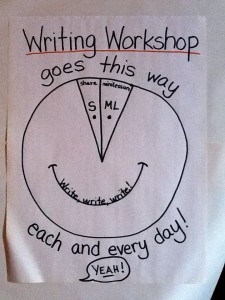 I’ll be leading a few workshops coming up:
I’ll be leading a few workshops coming up:
Characterization Through Dialogue
Saturday, September 29th, 4 p.m. – 6 p.m.
Characters are at the heart of stories; dialogue helps define characters and drives plot tension. In this workshop you’ll learn to develop characters, consider word choice, and define their voice through dialogue. The workshop will present essential tips to improve dialogue and explore how to write dialogue that rings true, deepens character, creates conflict, and more.
Cost: $20
.
Introduction to Speculative Fiction
Saturday, October 13, 9 a.m. – 12 p.m.
Here’s the thing: you know speculative fiction when you see it, even if you’re unfamiliar with all of the insider jargon used to describe its many subgenres. The big three are Horror (splatterpunk, atmospheric, psychological, etc), Fantasy (high, urban, historical, etc.), and Science Fiction (hard, cyberpunk, steampunk, etc.). So if the story takes place in a far off land or an alternate version of an existing one; whether it is extrapolating science into futuristic technologies with its impact on society or conjuring new forms of magic, speculative fiction is the genre of possibility. In this workshop you will learn about the special needs of these genres. All this is done with an eye toward submission and publication, so we will explore the marketplace, discussing where and how to submit your work.
Cost: Members $39, Nonmembers $57, Student, Teacher, Senior Members $33

